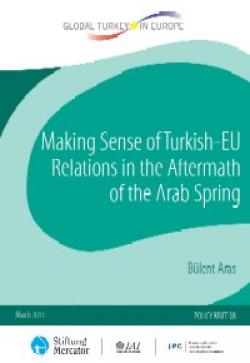Making Sense of Turkish-EU Relations in the Aftermath of the Arab Spring
Both the EU's recognition of the importance of its value system and Turkey's rediscovery of its European component in its foreign policy identity have occurred during a period of radical transformation in the Mediterranean region. The Arab Spring has resulted in a process of renegotiation over territory, identity and governance which has eventually fostered the idea of a new regional political community. The EU is in an advantageous position now if it truly wants to build a political community eastwards and southwards. One logical move would be a renegotiation in the EU over Turkey's role in a new vision for the future of the EU. Turkey's European identity and policy style will continue to shape its own neighbourhood policy as it is at the centre of a new geopolitical thinking. Ankara sees itself as having an orderinstituting role in its changing neighbourhood and is in a process of recalibrating its policies in this direction. The Turkish and EU models complement each other, and there is no possibility for any other model to compete with these perspectives in the foreseeable future.
Documento prodotto nell'ambito del progetto Turkey, Europe and the World. Pubbl. in IAI Research Paper 9.
-
Dati bibliografici
Roma, Istituto affari internazionali, 2013, 5 p. -
Numero
Policy Brief 8
Executive Summary
1. The EU/rope's Place in Turkey's Foreign Policy
2. The Impact of the Arab Spring
3. Turkey and the EU: Towards Progressive Geopolitics
Conclusion
Tema
Tag
Contenuti collegati
-
Ricerca27/12/2013
Global Turkey in Europe
leggi tutto -
Pubblicazione04/06/2013
Global Turkey in Europe
leggi tutto




